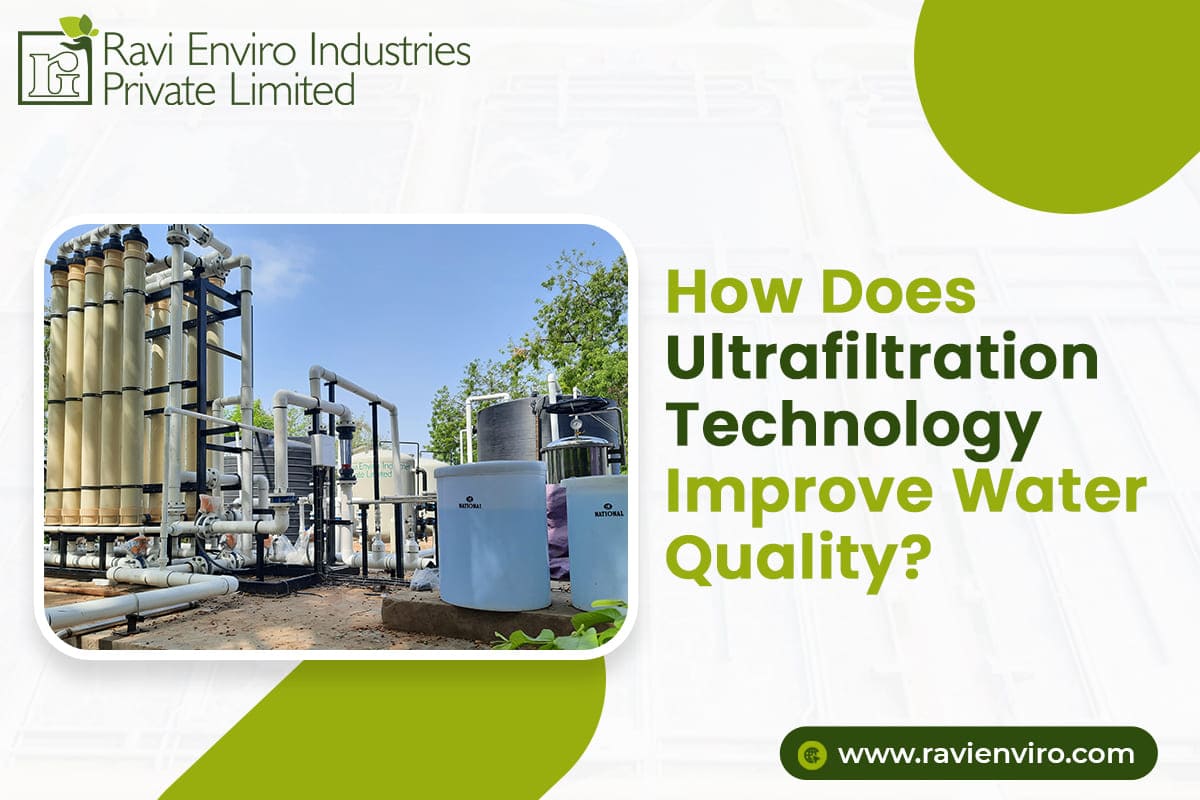
- Nov 26, 2024
- Ravi Enviro
- ultrafiltration (UF)
- 0 Comments
With water technology becoming more advanced, the role of ultrafiltration systems has become more profound than before. It is one of the best technologies for removing impurities such as silica, endotoxins, proteins, plastic, viruses, and dissolved particles, providing high-purity water. Ultrafiltration plants are employed in various areas such as drinking water production, food & beverages processing, wastewater treatment, biomedical & pharmaceutical applications, and more. In this blog, we discuss how ultrafiltration technology improves water quality, highlighting its role in water treatment in different industries.
The Power of Ultrafiltration Technology
Ultrafiltration is a renowned technology for water treatment that removes dissolved solids, particulate matter, bacteria, and suspended particles from water. The UF plant allows the water to flow through the semi-permeable membrane that lets water pass while trapping impurities. Similar to other membrane-based technologies such as reverse osmosis (RO), nanofiltration, and microfiltration. The main goal of ultrafiltration is to eliminate dissolved and colloidal debris in sizes between 0.1 to 1 micron. UF plants can retain debris between 0.005 to 10 microns. Ravi Enviro Industries Private Limited is a leading ultra filtration plant manufacturer in India specializing in UF systems for efficient and reliable water treatment systems for commercial, residential, and industrial establishments.
Benefits of Ultrafiltration Technology for High-Purity Water
- Versatility & Performance: UF plants efficiently dispose of pollutants regardless of the water source or quality. This makes ultrafiltration plants ideal for treating water from surface, ground, or wastewater.
- Does Not Require Chemicals: Ultrafiltration is a physical method that does not need chemicals, though chemicals are used for cleaning in order to prevent membrane clogging.
- Compact Design: Ultra filtration water treatment plant are designed to be compact and modular, requiring minimal space. This feature makes them an ideal choice for facilities with space constraints, providing a practical and efficient water treatment solution.
- High-purity Water: These wastewater treatment plants do not use chemicals and produce high-purity water. Ultrafiltration-treated water helps to meet industry regulations for compliance with suspended particles, microbiological pollutants, and turbidity. This means that the water meets the highest standards of purity and safety, making it an ideal water treatment solution for domestic and industrial use.
- Low-operating Cost: Ultrafiltration plants are cost-effective, as they do not require chemicals and consume less energy. This makes them a more economical choice compared to traditional water treatment systems, providing long-term savings and sustainability.
Requirements of Water Quality for Ultrafiltration Plants
Ultrafiltration needs specific inlet water temperature, pH levels, and concentrations. These standards need to be met to maintain the quality of water and effective UF performance.
- Temperature: The performance of UF membranes is highly impacted by the temperature of incoming water. The ideal efficiency for membrane permeability is at 25 degrees Celsius; as the water temperature, the permeability also rises. For optimal performance, ensure the water temperature is not too high.
- pH Value: While different UF plants have specific requirements, for PVDF or PAN materials, the pH range should be 2 to 12, and for cellulose acetate materials, the pH should be 4 to 6.
- Turbidity: The turbidity of the incoming water should be lower than 5NTU (Nephelometric Turbidity Unit). Impurities such as suspended solids, microorganisms, and others can make the water turbid, so keeping the turbidity lower than the required NTU ensure optimal performance.
- Suspended Solids & Colloids: Ultrafiltration technology can remove suspended solids and colloids. However, some colloids with specific charges can harm the membranes. This is when methods such as pH adjusters, sodium carbonate, and oxidizing agents can help enhance coagulation efficiency.
Ultrafiltration plants can be used for residential establishments to provide clean water for consumption and usage. It can tackle water requirements for cleaning, manufacturing, and other applications in commercial and industrial settings. If you need an ultrafiltration plant, get in touch with REIPL. As a trusted water treatment plant company in India, we are experts in designing, engineering, manufacturing, installing, and maintaining WWTP plants. We also provide a range of water treatment plant equipment, such as agitators, filters, clarifiers, storage tanks, flash mixers, oil skimmers, and more. For the best quotes, call us today.



